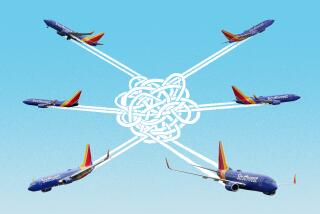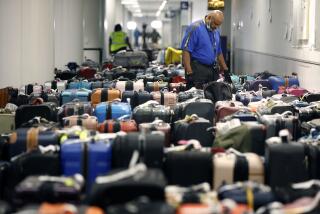Pilots Group Says Northwest Airlines Less Profitable Since Republic Merger
DETROIT — Northwest Airlines has done better than its competitors in limiting costs but has been less profitable since its 1986 merger with Republic Airlines, the Air Line Pilots Assn. said.
Northwest planes spent less time in the air and thus generated less revenue than those of American Airlines, Delta Air Lines and United Airlines from the beginning of 1986 through mid-1988, the association said in a study reported last weekend.
The association, which represents 4,800 Northwest pilots, based its findings on an analysis of U.S. Department of Transportation data. The pilots and Eagan, Minn.-based Northwest entered mediated bargaining in late 1988 after 19 months of negotiations failed to produce a new contract.
Drag on Profits
“We found not only was Northwest not making full use of its domestic resources, both planes and employees, but that this phenomenon was beginning to show up as a drag on the bottom line,” said Pete Quortrup, a Northwest co-pilot and association spokesman.
Northwest’s domestic operating expenses increased by 5% from 1986 to 1988, the study said. Expenses increased at American and United during that period by 18.8% and 15.5%, respectively, it said.
But American’s domestic operating revenues increased 29.1%, United’s rose 27.4% and Delta’s grew 17% during the period, while Northwest revenues were up only 2.5%, it said.
Profits for the period soared by 9,961.3% at American, 313.4% at Delta and 93.9% at United. Northwest profits declined 39.7% during the 30-month period, the study said.
In addition, it said, the number of hours flown daily by each American, Delta and United plane increased during the period and declined at Northwest.
The 1986 merger with Republic prompted Northwest to reduce service to many cities where both airlines had competed, Quortrup said. But Northwest left many newly available planes idle instead of assigning them to other routes, he said.
Chairman Declined Interview
Northwest Chairman Steven G. Rothmeier declined a request by The Detroit News to be interviewed about the pilots’ study but gave written responses to several questions in a story published Sunday.
Rothmeier acknowledged that Northwest scaled back use of its domestic fleet during the first six months of 1988 “to get a better handle on customer service.
“Anybody who flew Northwest in Detroit knew the problems we were having: poor on-time performance, baggage mishandling and other complaints, in large part all the result of inadequate airport facilities,” he wrote.
Northwest also absorbed relatively high labor costs during the period, including a 14% pay raise for former Republic pilots.
More to Read
Inside the business of entertainment
The Wide Shot brings you news, analysis and insights on everything from streaming wars to production — and what it all means for the future.
You may occasionally receive promotional content from the Los Angeles Times.










